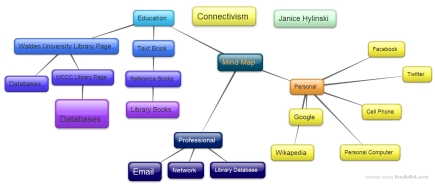Janice Hylinski
Learning Theories and Instruction
EDC 6115-1
• What did you find surprising or striking as you furthered your knowledge about how people learn?
o As this course is ending I am reflecting on all the different theories on learning we have discussed. Coming into this class my knowledge of learning styles was limited to learning styles of Visual learners, Auditory Learners and Kinesthetic Learners.
o I have come to understand that learning is much more multifaceted than that. I do believe we all have different ways we learn. But I do not feel that we have just one learning style. I believe as Kapp states in this quote
“The issue many forget is that “learning” is not one thing…it is a multi-layered word that tends to get treated as if it were just one thing…and it’s not. It is multi-facetted and that is why developing new models for “learning” is so difficult…there are too many levels for one school of thought or one model to do it all”. (Kapp, 2007)
o I believe it is important to study the different learning styles and theories and to keep them in mind but I also believe that instruction should be content driven.
“Instead, teachers should worry about matching their instruction to the content they are teaching. Some concepts are best taught through hands-on work, some are best taught through lectures, and some are best taught through group discussions.” (Glenn, 2009)
• How has this course deepened your understanding of your personal learning process?
o I think this class really has deepened my understanding of how people learn. I especially relate to the Adult Learning portion of the class. I am a firm believer in lifelong learning and I think as I have aged my thirst for knowledge has just increased.
o I think that today’s adult learner has many responsibilities. Unlike our earlier education we choose to pursue learning as an adult and we need to be self-motivated. But I also think adult learners face a lot of challenges. Technology continues to grow there is so much information is out there and so many different ways which information can be accessed.
• What have you learned regarding the connection between learning theories, learning styles, educational technology, and motivation?
Learning Styles -visual learners, auditory learners, and kinesthetic learners
Learning Theories about human learning can be grouped into four broad “perspectives”. These are
1. Behaviorism – focus on observable behavior
2. Cognitive – learning as purely a mental/ neurological process
3. Humanistic – emotions play a role in learning
4. Social – humans learn best in group activities
Education Technology – computer-based learning
Motivation – the internal thing that moves us to action, keeps us engaged in learning.
I believe all of these are connected. I believe we all have learned using different theories and employing different styles. Technology has become an important component of the way we learn. Keeping ourselves and our students motivated is a struggle. But understanding how people learn and studying the ARC Model will help learners and instructors to better understand practices that can be employed to assist.
• How will your learning in this course help you as you further your career in the field of instructional design?
o I think one of the most things to remember is to keep your students motivated. I would use the ARCS Model of motivation that we learned in Chapter 7 of our textbook
To boost motivation of online learners using the ARCS model:
(A) Attention – Use many different forums to present information, employ real life examples to catch student’s attention.
(R)Relevance – By using language and examples that the student can relate to or things that are currently part of the current climate.
(C) Confidence – Set the class up like scaffold using small lessons that build upon each other, let the class know what the expectations are, provide feedback and encouragement.
(S) Satisfaction – Encourage learning to apply the knowledge they are gaining, and praise them on tasks they complete.
I would also incorporate using library databases as a foundation to any online classes I would design.
Glenn, D. (2009). Matching Teaching Style to Learning Style May Not Help Students. The Chronicle of High Education, 1 – 6.
Kapp, K. (2007, January 2). Out and About: Discussion on Educational Schools of Thought. [Web log post]. Retrieved from http://karlkapp.com/out-and-about-discussion-on-educational/

